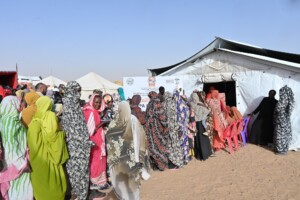Child sex abuse on the rise in Sudan capital
The Sudanese Ministry of Health has warned for a growing number of cases of sexual abuse of children in Khartoum state.
The Sudanese Ministry of Health has warned for a growing number of cases of sexual abuse of children in Khartoum state.
Addressing a forum on gender-based violence in Khartoum on Thursday, Dr Ibrahim Abdelrahman, director of the Health Ministry’s Primary Health Care Department, reported that the number of rapes of children, especially school children, has risen rapidly this year.
Surveys conducted by the Health Ministry in schools in the Sudanese capital this year showed a significant increase in mental health disorders among school students. It turned out that an increasing number of children have been sexually harassed or raped at home.
Abdelrahman announced that his Ministry has decided to establish new mental health clinics “to face this dangerous phenomenon”.
Batoul Abdelrahman, director of the Ministry’s Women and Child Health Department, noted “a significant deterioration in the mental health of women and children across the country”.
She attributed the increased number of suicides and other violent deaths recorded among women and children to “the proliferation of manifestations of violence across Sudan”.
‘Peripheries’
In July, El Jareeda newspaper published a report about sexual abuses against children in the capital.
The chairman of the National Union of Mentally Disabled People, Dr Yasir Mohamed Mousa, said that more than 3,500 cases of sexual abuse against children were recorded in 2014 and early 2015.
He noted that many rape cases against minors occur in Khartoum’s peripheral districts, particularly in El Baraka, El Haj Yousif, Mayo, Mandela, Gabousho, and El Nasir, where there are no police stations and most of the residents are displaced people from the war zones of Darfur, the Blue Nile, and the Nuba Mountains in South Kordofan”.
According to a teacher of the Lubaba Basic School in El Nasir district, southern Khartoum, eleven of the school’s pupils were raped at home. Six of the cases resulted in pregnancies.
He claimed that the crimes reported to the police represent less than five percent of the actual rape cases.
Any victim of sexual violence has to report the incident to the police by filling out a Form 8. Obtaining this form used to be obligatory for victims before being allowed treatment at a hospital until 2005 when the law was revised. Yet an international women’s initiative reported three years ago about confusion among the Sudanese police, medics, and victims about the use of the form.











 and then
and then